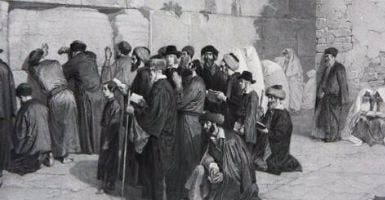Parshat Kedoshim
“You shall rise in the presence of an elderly person and honor the presence of a sage” (Vayikra 19:32).
This famous Pasuk, often quoted as the source for the Mitzva to honor the elderly, is subject to a broad Machlokes as to its precise intent.
The discussion begins with the Sugya in Maseches Kiddushin (32b-33a). We will examine the Sugya, explain the various opinions cited with the interpretations of the Poskim, and outline the conclusions l’Halacha. In examining this Sugya, we will identify a number of different perspectives on the elderly and on the concept of Zikna (old age) more broadly.
The Rabbis taught: “You shall rise in the presence of an elderly person”. One might have though one should stand for a “Zaken Ashmai” – the Torah therefore states, “Zaken”, which can only refer to a Chacham, as the Pasuk states “Gather for me seventy men from the elders of Israel” (Bamidbar 11:16). R’ Yosi haGelili says, the word “Zaken” only refers to somebody who has acquired wisdom, as the Pasuk states, “Hashem acquired me at the beginning of His way” (Mishlei 8:22). Isi ben Yehuda says, “You shall rise in the presence of an elderly person” – the implication is that any elderly person [is included]”.
According to the Tana Kama, the word “Zaken” specifically refers to a Chacham and this excludes a “Zaken Ashmai” from honor. Who is a “Zaken Ashmai”? Rashi explains that it refers to a sinful and ignorant person (“Ashmai” is related to the word “Asham” – guilt). Tosfos ask that this explanation renders the position of Isi ben Yehuda (who disagrees with the Tana Kama)incomprehensible. According to Isi ben Yehuda, the word “Zaken” does not exclude a Zaken Ashmai, thus, according to Rashi’s interpretation, there would be an obligation to honor a sinful person! Considering that there is a Mitzva to shame and disparage a willful sinner, this is surely an impossible proposition.
The Ramban concurs with Tosfos and adds that with regard to Kibbud Av vaEim, there is no obligation to honor a parent who is not “Oseh Ma’ase Amcha[1]”– i.e. who is not loyal to Torah and Mitzvos. Why should the Mitzva of honoring a Zaken be any different?
Tosfos, therefore explain that a “Zaken Ashmai” does not refer to a sinful person but to an ignoramus (“Ashmai” is related to the word “Shomem” – desolate or barren). Obviously, there is no basis for disparaging an ignoramus, but is there a Mitzva to honor him in his old age? According to the Tana Kama, age is no reason to accord honor – wisdom is the only basis for honor. This is alluded to by the word “Zaken” which indicates an acquisition of wisdom (which is usually the case with the elderly who grow wise from life experience). However, according to Isi ben Yehuda, a person should be honored when he reaches old age even if he isn’t a Chacham (as long as he isn’t a wicked person).
There are two approaches to answering the questions of Tosfos and the Ramban on Rashi:
The Pnei Yehoshua contends that, according to Rashi, there is no connection between the obligation to disparage the wicked – which is intended to convince them to alter their ways – and the obligation to honor a person in his old age. This is consistent with the Gemara (cited below) that relates that R’ Yochanan would rise in the presence of elderly non-Jews! Thus, according to Rashi, Isi ben Yehuda held that one is even obligated to honor an elderly person who is a Rasha.
The Aruch haShulchan (Y.D. 244:2) has a different approach. He maintains that Rashi does not refer to a willful sinner but to a person who sins because he is ignorant. According to Tosfos, Isi ben Yehuda would not consider this person worthy of honor for he ultimately does not observe the Mitzvos. Rashi, holds that since his sinful acts stem from ignorance, he is deserving of honor.
Rashi’s position will become clearer through an examination of the aforementioned custom of R’ Yochanan (who held like Isi ben Yehuda) to rise in the presence of elderly non-Jews. R’ Yochanan explained that he did so because they had experienced and suffered so much – “Kama Harpatki Adu Alayhu d’Hani”. Why was this a reason to honor them?
The Sefer haChinuch (Mitzva 257) states:
The main reason that a person is created is on account of wisdom – so that he will recognize his Creator. Therefore, it is appropriate that people honor those who have attained wisdom, and others will also thereby be inspired to attain it. This was the basis for the position of Isi ben Yehuda in Maseches Kiddushin who rules that even a Zaken Ashmai – in other words a person who isn’t wise – is included in the Mitzva and it is appropriate to honor him. For over many years he has seen and recognized a bit of the acts of Hashem and His wonders. Therefore, he is worthy of honor.
Even though the Sefer haChinuch defines Zaken Ashmai as “a person who isn’t wise”, which is not Rashi’s definition, we can still use his approach to explain Rashi’s position along the lines of the Aruch haShulchan we quoted above.
There are two kinds of sinful people. Some sin willfully and intend to rebel against Hashem. They are not worthy of honor under any circumstances at any age. Others only sin due to ignorance, not rebellion, and if they would remain ignorant sinners throughout their lives, they would similarly not be worthy of honor. However, as the Sefer haChinuch explains, they are likely to change their ways as they grow old. Life’s events draw them closer to the belief in Hashem’s omnipotence and to acceptance of their own weakness and frailty. The trials and tribulations of life and the effects of aging bring them to the recognition of their Creator, unlike the youthful who are in the prime of their physical life. Therefore, according them honor is indeed appropriate, and those who honor them are themselves drawn closer to Hashem.
The Aruch haShulchan’s approach also resolves the question of the Ramban. Since we are discussing a Zaken who only sins due to ignorance, he would still be considered “Oseh Ma’ase Amcho” andhis children would be obligated to honor him.
However, according to the Pnei Yehoshua’s approach, the Ramban’s question remains unresolved. The Pnei Yehoshua contended that there is a Mitzva to honor a wicked Zaken, as we are obligated to denigrate him only to convince him to change his ways. But in Hilchos Kibbud Av va’Eim, we find that children are not obligated to honor parents who are Reshaim. Why is honoring a parent different than honoring a Zaken?
Perhaps there is a distinction between the Mitzvos of honoring parents and honoring the elderly. The Rishonim explain that a person is obligated to honor his parents as a model for honoring Hashem. Honoring parents is an expression of respect and deference to those who brought him into the world. This will lead to a similar attitude towards Hashem. This is why the Torah compared the honor due to a parent and the honor due to Hashem – indeed, a person’s parents and Hashem are considered three partners in his creation (Kiddushin 30b).
If so, it is easy to understand why a person is not obligated to honor a parent who is disloyal to the Torah. Honoring him would negate the honor of Hashem rather than lead to it. However, the obligation to honor the elderly is not to lead to honoring Hashem. Therefore, the notion of honoring them even if they are Reshaim is not implausible.
Returning to the Gemara in Kiddushin, the Tana Kama who asserted “Zaken only refers to a Chacham” and R’ Yosi haGelili who said that “Zaken refers to somebody who has acquired wisdom” appear, at first sight, to be saying the same thing. However, the Gemara explains that there is a basic difference between them. According to the Tana Kama, a person is only obligated to honor an elderly Chacham – not a younger Chacham. According to R’ Yosi haGelili, a person is obligated to accord honor to anybody who has acquired wisdom.
The simple understanding of their Machlokes is that R’ Yosi haGelili holds that the word “Zaken” does not refer to age but to wisdom. Therefore, even a young Chacham is deserving of honor. The Tana Kama holds that the word Zaken refers to age, therefore, although an unlearned elderly person cannot attain the tile of “Zaken”, the word Zaken does indicate that the person is at an advanced stage of life. Therefore, there is no Mitzva to accord honor to a young Chacham.
Tosfos, however, maintain that even R’ Yosi haGelili agrees that there is an obligation to honor an elderly person (if he isn’t a Rasha). He only meant to add an additional point which is that there is an obligation to honor any Chacham, even if he is still young. The Chasam Sofer (Shu”t 1:233) explains that R’ Yosi haGelili interprets the Pasuk as follows: “You shall rise in the presence of an elderly person,” – even if he isn’t a Chacham – “and honor the presence of a sage” of any age.
The Shulchan Aruch rules (Y.D. 244:1):
There is a Mitzvas Asei to rise in the presence of any sage – even if he is not elderly but a young Chacham – even if he is not one’s Rebbi. It is also a Mitzva to stand in the presence of an elderly person, meaning one older than seventy.
The Rema comments on the latter ruling:
Even if he is unlearned, as long as he is not a Rasha.
Ostensibly, the Shulchan Aruch rules like Rashi, and, therefore, there is an obligation to honor any elderly person – even a Rasha (as the Halacha is in accordance with Isi ben Yehuda). If not, the Shulchan Aruch should have added the stipulation of Tosfos that the elderly person must not be a Rasha, as did the Rema. (In the Beis Yosef, the Mechaber does cite the view of Tosfos.)
However, according
to the Aruch haShulchan who argued
that Rashi only refers to a person who sins due to ignorance, there is no need
to say that there is any dispute between the Shulchan Aruch and the Rema.
The Shulchan Aruch did not stipulate
that one only accords honor to a Zaken
who is not a Rasha because the vast majority of people sin due to
ignorance, not deliberately. Therefore, according to the Aruch haShulchan, they
are still worthy of honor. However, the Rema
wanted to state explicitly that a Zaken
who is an outright Rasha, is not
accorded any honor. His addition only clarifies the Shulchan Aruch’s
ruling.
[1] Literally, “who performs actions of your people”














